

Abilis CPX is produced in two versions of different sizes and number of free slots:
Abilis CPX is costantly improving, that's why those specifications are subject to change without notice on this manual.

For more detailed descriptions of all the accessible functions from the front panel, please refer to the section Front panel commands.
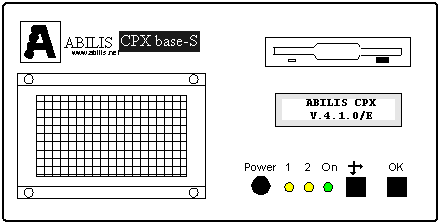
Figure 1. Base-S, front panel.
The following figure shows the back panel; just as example, some adapters are already plugged in.
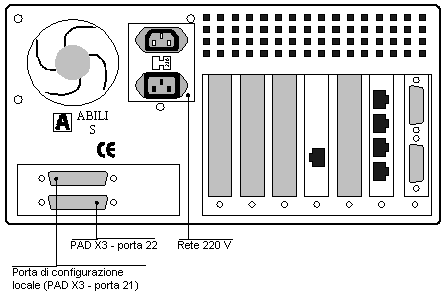
Figure 2. Base-S, back panel.

For more detailed descriptions of all the accessible functions from the front panel, please refer to the section Front panel commands.
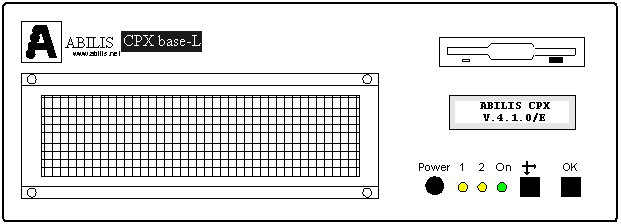
Figure
3. Base-L, front panel.
The following figure shows the back panel; just as an example, some adapters are already plugged in.
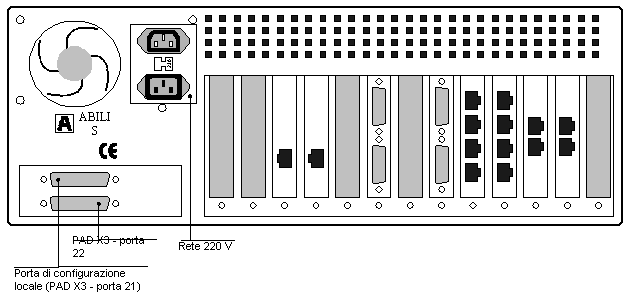
Figure
4. Base-L, back panel.

The module "Watchdog hardware", or simply "Watchdog" is an Abilis working mode Supervisor. It is set on the front panel, where also are set leds "1" and "2" and the keys "Select" and "OK".
This module is based on an autonomous processor, which constantly checks a signal generated by Abilis CPX during its regular functioning.
When Abilis is switched on, and during all the software loading procedure, the Watchdog quickly blinks led 1 and keeps off led 2. It is watching the starting procedure of Abilis CPX.
When the software is definitely loaded and running, both leds start to light simultaneously with a regular time interval of 1 second. The module is watching the CPX in its normal working mode.
During its regular working mode, the Abilis CPX change the "LIVE" signal status every (c.a.) second.
The Watchdog, not only checks this signal, but it signals its status by switching on and off leds "1" and "2" with the same frequency.
If the LIVE signal variations are not detected for a time interval bigger than "TLIVE" (set by the dip-switch SW1), the Watchdog will find out the anomaly, save it for next readings and reset the Abilis CPX.
A similar procedure is executed also while the software is loading, i.e. every time the Abilis CPX is switched on, or after every reset (warm start, restart system, auto warm start): the Watchdog expects 5 status variations of the LIVE signal in a TBOOT time interval (set by the dip-switch SW1).
If this will happen, then the Watchdog will start monitoring the system using the TLIVE timer, while if it won't happen the Watchdog will detect the anomaly, save it for next readings and reset the Abilis CPX.
During the normal working mode of the Abilis CPX, the Watchdog doesn't bring benefits, however it gives safety in those applications called "mission critical" and "unattended".
In such applications, it is extremely important the system never stops working, however software complexity and the events amount to be handled is such that even the most tested system may have some bugs.
Let's suppose an event would occur and stop working the system, communications would be cut until (maybe even the day after) the technician would fix that bug.
In this critical situation, the Watchdog will detect the absence of activity (if the system stops, it doesn't generate the LIVE signal) and reset the Abilis CPX.
At every start, the Watchdog checks whether the previous time it has detected anomalies and, if yes, saves the event in the System Log.
| 3 | 2 | 1 | TBOOT | 6 | 5 | 4 | TLIVE | |
|---|---|---|---|---|---|---|---|---|
| off | off | off | 1 Minute | off | off | off | 15 seconds | |
| ON | off | off | 2 Minutes | ON | off | off | 30 seconds | |
| off | ON | off | 3 Minutes | off | ON | off | 45 seconds | |
| ON | ON | off | 5 Minutes | ON | ON | off | 1 Minute | |
| off | off | ON | 7 Minutes | off | off | ON | 2 Minutes | |
| ON | off | ON | 10 Minutes | ON | off | ON | 3 Minutes | |
| off | ON | ON | 13 Minutes | off | ON | ON | 4 Minutes | |
| ON | ON | ON | 16 Minutes | ON | ON | ON | 5 Minutes |
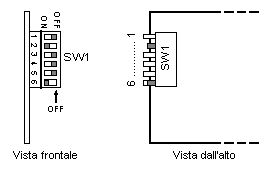
Figure
5. Watchdog, position of SW1 on the front panel.
The correct configuration for the current version is: 3 minutes for TBOOT and 30 seconds for TLIVE.
The SW1 position on the Watchdog module and the default configuration have been described in the figures shown above.

Both PCI and ISA adapters,depending on the number of free slots, can be plugged in the Abilis CPX.
![]() When
the CPX hardware configuration is chosen, i.e. all the needed adapters are
selected, it is also necessary to verify the availability of free slots (PCI and
ISA) in the requested CPX base model.
When
the CPX hardware configuration is chosen, i.e. all the needed adapters are
selected, it is also necessary to verify the availability of free slots (PCI and
ISA) in the requested CPX base model.